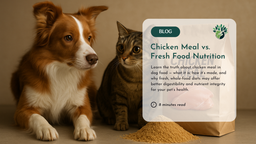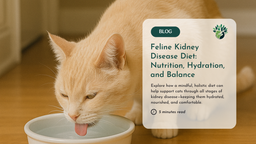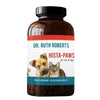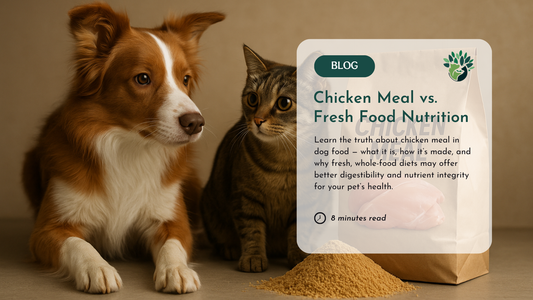As a dog parent, your top priority is to keep your furry friend healthy and happy. With decades of experience in veterinary medicine, I've helped countless dog owners treat their pets' health issues.
However, my mission is to help you prevent these problems before they start. From accidental poisoning to kidney disease, there are numerous dangers you can avoid to prolong your dog’s life and ensure their well-being. Here are seven common dog health problems you can prevent, supported by science-backed tips and research:
1. Poisoning
Even the most responsible pet owners can’t always prevent their dogs from encountering toxic substances. Dog poisoning can occur from many sources, not just antifreeze. Household and outdoor plants, certain foods, and common chemicals can all pose risks.
Studies show that common household plants like Lilies, Poinsettias, and Geranium as well as foods like chocolate, grapes, and xylitol (a common artificial sweetener), can be highly toxic to dogs (ASPCA Animal Poison Control Center). These substances can cause a range of symptoms from gastrointestinal upset to neurological problems and even death.
Actionable Tip: Ensure your home and garden are free from toxic plants like Lilies, Poinsettias, and Geraniums. Replace them with pet-safe alternatives. Place household chemicals in locked cabinets or high shelves where pets cannot access them. Be vigilant about cleaning up spills immediately. Have a first-aid kit and know the basic steps to take if poisoning is suspected. Read our comprehensive guide on avoiding accidental poisoning.
2. Contaminated Dog Food
Contaminated dog food can be a hidden danger right inside your home. Pet food recalls happen, and they can be dangerous for your dog. One way to mitigate this risk is by being cautious with store-bought pet food.
The FDA reports that certain pet foods have been recalled due to contamination with Salmonella, Listeria, and other harmful pathogens (FDA Pet Food Recalls). Contaminated food can cause severe illness in dogs, including vomiting, diarrhea, and in severe cases, death.
Actionable Tip: Stay updated on recent pet food recalls and consider switching to natural, wholesome food options to ensure your pet's safety. Preparing homemade dog food with vet-approved recipes can also reduce the risk of contamination and provide your dog with balanced nutrition.
3. Obesity
Obesity is a significant health risk for dogs, just as it is for humans. Overweight dogs are at higher risk for various health issues, including diabetes, heart disease, and joint problems.
A study published in the Journal of Veterinary Internal Medicine found that obesity in dogs is associated with a shortened lifespan and increased risk of chronic diseases (Kealy et al., 2002). Maintaining a healthy weight through proper diet and exercise is crucial for longevity and quality of life.
Actionable Tip: Switch to a diet rich in natural, wholesome foods, and maintain a proper calorie intake. Regular exercise, tailored to your dog’s breed and health status, is also essential in keeping them fit and healthy. Follow our tips to prevent your dog from becoming obese.
4. Serious Damage from Chicken Bones
Feeding your dog chicken bones might seem harmless, but it can cause severe health problems like rectal bleeding, dehydration, and vomiting. Cooked bones, especially chicken bones, can splinter and cause internal injuries or blockages in dogs. These injuries can be life-threatening and often necessitate surgical intervention.
Actionable Tip: Never feed your dog cooked bones and provide safe alternatives like chew toys or bones designed for dogs. Ensure all household members understand these dangers, dispose of bones properly, and keep them out of your dog's reach. Familiarize yourself with the symptoms of internal injuries and seek immediate veterinary care if needed. Learn about the dangers of chicken bones and other harmful foods in our detailed article to keep your dog safe.
5. Chronic Urinary Tract Infections (UTIs)
Chronic UTIs can be a recurring issue for many dogs. Improving gut health is key to preventing these infections. A healthy gut microbiome can help reduce the incidence of UTIs in dogs and supports overall immune function, which can prevent infections.
Actionable Tip: Consider adding probiotic supplements to your dog’s diet and ensuring they have access to clean, fresh water at all times. Learn how a healthy gut can stop chronic UTIs and find practical steps to boost your dog's gut health in our comprehensive courses and blog post.
6. Kidney Disease
Kidney disease is a serious and common issue in dogs. Proper nutrition is crucial for prevention. Dietary modifications are one of the key component of managing kidney disease in dogs, and these specific changes have been supported by veterinary research.
A diet low in phosphorus and high in omega-3 fatty acids can help slow the progression of kidney disease in dogs. High levels of phosphorus can worsen kidney damage and accelerate the progression of chronic kidney disease (CKD). Reducing dietary phosphorus helps manage blood phosphorus levels and reduces stress on the kidneys. Omega-3 fatty acids, particularly eicosapentaenoic acid (EPA) and docosahexaenoic acid (DHA), have anti-inflammatory properties. These fatty acids can help reduce kidney inflammation and potentially slow the progression of kidney disease.
Actionable Tip: Avoid high-phosphorus foods like dairy products and organ meats; focus on low-phosphorus proteins like lean meats and eggs. Incorporate fish oil supplements rich in EPA and DHA; consult your vet for dosage. Regular blood tests and urinalysis can help monitor kidney function and catch issues early.
Ready to take action for your pet’s kidney health?
Start with our Comprehensive Kidney Health Course to understand the root causes and holistic care strategies. Then explore our step-by-step Kidney Support Protocol by Dr. Ruth Roberts to confidently support your pet with nourishing food, supplements, and lifestyle adjustments.
7. Cancer
Lowering the risk of cancer in dogs is always preferable to treating it. Certain breeds are more prone to specific types of cancer, making genetic predisposition a crucial factor to consider. Early detection through health screenings can identify potential issues before they become severe.
Actionable Tip: Avoid exposure to known carcinogens such as tobacco smoke, pesticides, and certain household chemicals. Providing a diet rich in antioxidants, omega-3 fatty acids, and high-quality proteins can support overall health and strengthen the immune system, potentially reducing cancer risk. Regular exercise and stretching helps maintain a healthy weight, reducing the risk of obesity-related cancers.
Final Thought
The most important step in supporting your dog’s long-term health begins with their bowl. A nourishing, balanced diet lays the foundation for wellness and can help reduce the risk of many common health issues. If you're ready to take a more intentional approach to feeding, explore how the CrockPET Diet® can guide you in creating meals tailored to your pet’s unique needs, simple, wholesome, and full of healing potential. Stay informed, be proactive, and give your furry friend the vibrant, healthy life they deserve.
References:
- ASPCA Animal Poison Control Center: Toxic Plants to Dogs
- Kealy, R. D., et al. (2002). "Effects of diet restriction on life span and age-related changes in dogs." Journal of Veterinary Internal Medicine.
- Brunetto MA, Ruberti B, Halfen DP, et al. (2021). "Healthy and Chronic Kidney Disease (CKD) Dogs Have Differences in Serum Metabolomics and Renal Diet May Have Slowed Disease Progression."
















